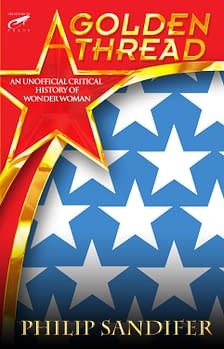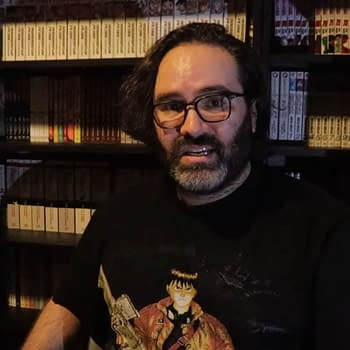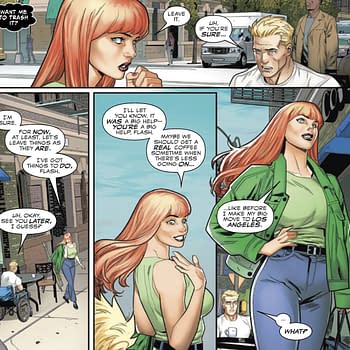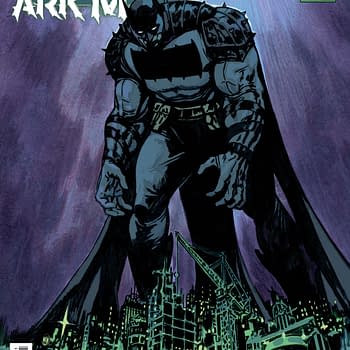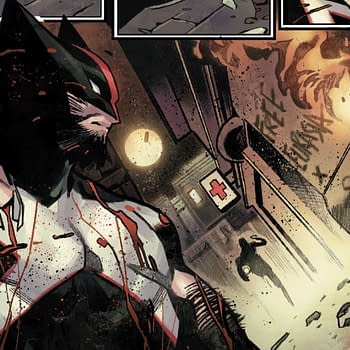Posted in: Comics | Tagged: Batman, Philip Sanifer, Robert Kanigher, william moulton marston, wonder woman, x-men
A Golden Thread – The Unofficial Critical History Of Wonder Woman
Philip Sandifer writes for Bleeding Cool:
It seemed like a simple enough plan. Write a history of Wonder Woman, focusing on her comics appearances. Use Kickstarter to bankroll the production costs, and have a nice little book at the end. Instead I got a harsh lesson in the difference between having an idea and making a thing.
My first clue should have been the reason I wanted to write about Wonder Woman. I mean, there are easier heroes to write about. If you do a history of Batman or of Spider-Man you get characters that have been at least relatively consistent throughout their lives. Sure there's a huge difference between the Adam West Batman and the Frank Miller Batman, but they're still just two extremes of takes on the same sort of character. That's what makes dashing off Batman or X-Men movies so easy. The core concept is crystal clear.
But what's interesting about Wonder Woman is how messy a character she is; how DC seems almost embarrassed to have this feminist icon who infamously started off as a weird bit of bondage feminist by a kind of wacky psychologist, and how much time they spend running from that concept. How she exists in this weird half-state of being, on the one hand, part of the "DC Trinity," and on the other hand a character who has constantly had her book restarted and renumbered, who rarely sustains more than one title, and who at several times in her history has felt like she's only getting a solo book because DC doesn't want to deal with the bad press involved in cancelling the title.
So I should have known from the start that my plan to focus on the kinky sexuality of William Moulton Marston's original character and how it evolved over time wouldn't work. The original title of the book – the one I Kickstarted it under – was Paradise Dungeons. I thought it was a cute title. I still do, but it's just not the title for what the book became. I mean, it's still got loads about Marston's idiosyncratic vision, including a thorough explanation of how Wonder Woman fit into his larger psychological theories, and an extended discussion of how the original Wonder Woman artist, Harry G. Peter, influenced and shaped the character.
But instead of a book all about kinky bondage and Wonder Woman, I found myself writing a book called A Golden Thread. I got the name from an old Pete Seeger song, but I love the image – Wonder Woman as a link across seventy years of feminism. Sometimes, like in the so-called I Ching era, she's at the forefront of it, providing a better vision of feminism than the feminist activists of the time (who foolishly attacked the book and caused it to regress a decade in a single issue). Other times, like in the dire twenty year run of Robert Kanigher, who took over the book after William Moulton Marston died, she's largely a regressive figure, and the book seems determined to run and hide from any feminist or political implications. But no matter what, she's been there, as a massive piece of popular culture, for over seventy years of feminist history.
And writing it, I became fascinated by that messiness. Because, I realized, it reflected how feminism actually worked. Progress isn't some easy, straightforward line. It's full of half-steps, both forward and backwards, often at the same time. Progress isn't something that makes sense and advances neatly. It's just a matter of making new mistakes. And that turned out to be what writing a book on Wonder Woman is like. What I expected to take six months took about four times that, and was marked by constant second-guessing. I cut about a third of the book, changed the title, changed the focus, went through two separate and eventually backed out of two bad publishing deals, and, along the way, managed to have virtually the entire Kickstarter fund stolen from me in a spectacular error of trust on my part.
And yet, in the end, I got a book that I'm proud of. One that says everything I wanted to say about the character, even though I didn't realize most of it when I envisioned the book.
By the end I understood what people meant when they said Wonder Woman was hard to write, and that it was difficult to figure out how to make a movie out of her. Of course she is. She's a character who, more than anything, is defined by the fact that she's not a simple, straightforward image. The entire point of her is that she isn't just one thing. And that's the opposite of the big, straightforward aesthetic of superhero movies. Wonder Woman doesn't have a straightforward one-sentence description.
The only problem is that people treat that like it's a bad thing. Yes, of course making a Wonder Woman movie is hard. But it's as hard as making a movie about a character who's spent seventy years as a feminist icon should be. Much like writing a book about her is hard. But oh so very worth it.
Philip Sandifer is the author of A Golden Thread, available now in print and ebook. Bleeding Cool readers can use the coupon code BM97T through Tuesday, November 5h to get two dollars off the ebook edition. He blogs at philipsandifer.com, including the weekly history of British Comics The Last War In Albion."


